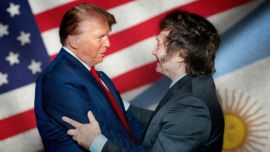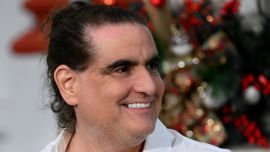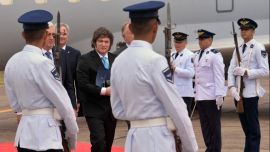Argentina’s black market exchange rate has already surged nearly 25 percent above the official rate, meaning that despite desperate currency controls set in place by newly minted Finance Minister Hernán Lacunza, less than four weeks into the job, dollars continue to flow out of the country. This capital flight, coupled with a draining of the Central Bank’s foreign reserves that has already consumed some US$15 billion since the primaries in an attempt to protect the value of the beleaguered peso, is seriously weighing on market confidence in South America’s third-largest economy. Add absolute uncertainty over the much needed disbursement of a further US$5.4- billion tranche of the International Monetary Fund’s record bailout package, which was initially constructed to stabilise the economy in the face of an external shock, and the situation becomes even more dire for President Mauricio Macri, who is looking to the October 27 election with some level of optimism. Where it comes from isn’t entirely clear.
It’s obvious that the president’s economic philosophy is as far possible from currency controls and interventionism of financial markets as possible. This was explained in last week’s column, ‘Is this you, Macri?’ Where it was explained that Macri’s absolute liberalisation of the capital markets, which many now deem extreme as it was more permissive than most OECD countries including Japan, was part of his strategy to attract foreign investment. Yet, Macri, the tamer of populism, “breaker of chains, and mother of dragons” in the market’s view at the time, has presided over an economic collapse that once again has seen Argentina default on its debt (this time peso-denominated debt, considered by many an impossibility before it happened), put limits to banking withdrawals and dividend repatriation for international corporations, freeze energy prices (directly hitting the “crown jewels” of Vaca Muerta), and generate fiscal disbursements to the population which will harm his deficit reduction crusade, among other measures.
Macri’s emergency agreement with the IMF could end up being the noose with which his presidency is finally hung. The record US$57-billion stand-by loan was an emergency facility aimed at stabilising the economy, which in practical terms meant it should generate confidence that the Central Bank was well stocked, allow the government to cover its deficit spending, and intervene the currency markets if the peso went haywire. It was structured so that it is paid in tranches after IMF technical reviews, supposedly a measure to avoid mistakes of the past. Yet, the PASO primaries resulted in such a slap in the face for Macri by Alberto Fernández and his political godmother, Cristina Fernández de Kirchner, that the market freaked out, sending the peso-dollar exchange rate as high as 66 pesos per greenback and throwing the economy into a deadly tailspin. A very fragile pax cambiaria ensued as a dollar- tourniquet has stymied a massive move out of pesos and into dollars, generating an exchange rate premium that promises to widen, as Lacunza and Central Bank Governor Guido Sandleris try to develop additional measures to clamp down on capital flight, which necessarily generates economic disruptions and an impossibility to understand relative prices. And, as the president of a leading international bank in Argentina recently told me, “it is impossible to grow with a cepo in place.”
After losing the PASO primaries, Macri’s emergency measures appeared to violate its agreement with the Fund. Alberto Fernández, revealing his true colours, asked the IMF to withhold the upcoming disbursement as it violated the Fund’s own internal rules. Fernández, correctly in my opinion, told the Fund’s representatives they were equally responsible for Macri’s economic disaster. The market freaked out even more. All of this has called into question whether the Fund will actually transfer Argentina the US$5.4 billion it was expected to hand over in mid-September. After remaining quiet for weeks, IMF spokesman Gerry Rice indicated they would receive Lacunza in Washington in late September, meaning the Board would analyse the situation and come to a decision, which in turn means the funds wouldn’t be available until October. The real election is on October 27, which begs the question, isn’t the fund purposely extending its own bureaucratic processes to sit Alberto on the negotiating table, assuming he wins? And will he have the support of the United States and Donald Trump?
Thus, Macri’s last days in office will be marked by a constant deterioration of Argentina’s economy, which could trigger further currency controls and a deeper fall in global market confidence.
At the same time, there are questions as to whether further defaults will occur, even if selective and temporary, further hurting the country’s credit ratings and future prospects. This is a consequence of not receiving the Fund’s money, which had been budgeted, and which will cause further pain and even the potential of pushing inflation higher.
The leader of the ruling Cambiemos (Let’s Change) coalition – recently rebranded Juntos por el Cambio (Together for Change) – appears to be drowning just before reaching the shore. It is un- questionable that the década ganada that spanned the three Kirchner governments left the country in ruins, particularly its economy. While one can argue about the methodology used, Macri’s intentions were in the right place, as he understood that chronic deficits needed to be eliminated, while the export sector was the key to eroding the stranglehold of the country’s obsession with the dollar. Yet his execution, in particular this final year, was disastrous. Accusing Macri and the IMF of financing capital flight is a syllogism, as the purpose of the standby agreement was to be used to stabilise the economy, which in part means defending the value of the peso. Macri needed to throw enough dollars back at the market while conducting reforms that generated confidence to the point where the world, and Argentines, began to believe.
That’s when financial flows would stop working against the peso and when real investors should begin to come in. Yet, when protecting the value of the peso translated into creating a nominal anchor for the dollar exchange rate – which in turn drags inflation – becomes your electoral strategy, you better have enough dollars to defend the currency. Macri, of course, didn’t have them.
What of Mr. Fernández and the widow of his former boss? It is being rumored that he asked orthodox economist and Macri basher Carlos Melconian to draft an economic plan, while his representative with market participants has been Guillermo Nielsen.
This suggests further austerity is underway, which would continue Macri’s policy of targeting the fiscal deficit. There is a clear correlation between economic activity and inflation in Argentina, which begs the question of how to control inflation while boosting the economy, something Fernández has promised to do. And what about Madame de Kirchner, and the social organisations already putting pressure on Alberto?
It seems we are back to where we started.
* – This piece is a continuation of last week’s column, “Is this you, Macri?”




















Comments